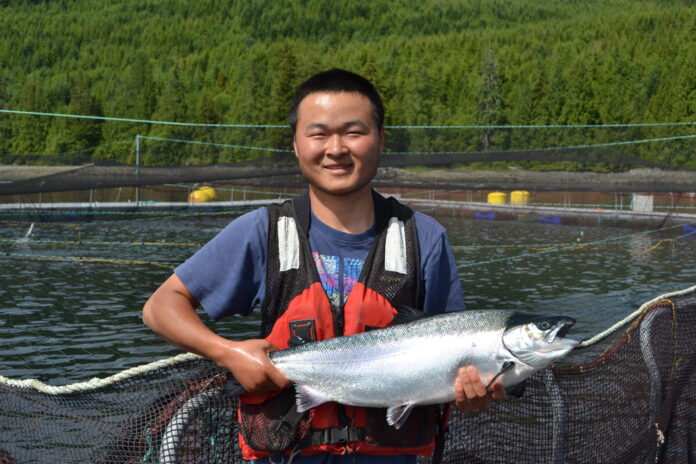Net-pen salmon farms in BC have five years to change completely to closed-containment systems, or get out of the ocean entirely.
Fisheries Minister Diane Lebouthillier made the announcement today, setting a deadline of June 30, 2029. She also said a long-promised transition plan will finally be released in draft form at the end of July.
In a press conference this afternoon, Indigenous leaders from the First Nations Coalition for Finfish Stewardship said the decision shows the government’s failure to commit to real reconciliation.
“This is a political decision. This is not based on science or fact,” said Isaiah Robinson with the Kitasoo Xai’xais Nation. “It’s based on the appeasement of white, privileged activists who fearmonger false data and build anti-fish farm narratives.”
Robinson’s nation near Klemtu has supported salmon farming for decades. He said salmon farming allowed his remote coastal nation to find pathways out of poverty and despair. He says his nation now has 99% employment, and hasn’t experienced any suicides for more than a decade.
Ahousaht hereditary chief Richard George on the West Coast, who oversees the largest remaining cluster of salmon farms in BC, agreed.
“Our rights have been dismissed in favour of privileged, liberal, urban riding political narratives,” he said.
George pointed out that land-based closed-containment systems will never happen in BC, because the added energy, land and labour costs, plus the hundreds of millions required for new construction, will make them unable to compete in a global market.
“Five years to transition to land-based or closed containment in our territory is the same as shutting our operations down,” he said.
Dallas Smith, spokesperson for the Coalition, said nations were only informed the night before about today’s announcement, despite asking for years to be included in the decision-making process. He called it a “step backwards” for reconciliation.
“The social situations our communities are facing are only exasperated by short-sighted decisions like this,” he said. “We need to continue to work together in a meaningful transition to find that path forward.”
The federal government will renew remaining licences for the next five years, but going forward, the only new licences which will be considered will be for closed-containment systems.
The provincial government also weighed in on the announcement. Nathan Cullen, Minister of Water, Land and Resource Stewardship, who as a federal NDP MP demanded the farms be moved to closed-containment systems, said the transition plan details need to be made clear.
“Again and again, we have asked the federal government to deliver supports for B.C. workers, families and communities as part of any transition plan. Coastal communities need a clear plan and significant funding from the federal government to support workers and communities,” he said in a statement. “The federal government needs to work directly with impacted communities and workers on next steps, and they must make sure First Nations have a direct role in determining what the transition looks like in their territories.”
Suppliers to the industry say the decision means more uncertainty and instability, and will discourage investment and innovation.
“This decision creates a highly uncertain situation for our small business, stalling our plans for growth and development,” said Stephanie King in Campbell River, founder of a company which builds custom water-monitoring systems for farms. “Our plans to expand our office space in Campbell River have been put on hold. This is one small example of the widespread impact of this decision.”
The BC Salmon Farmers Association says it will have more to say in the coming weeks after they have had time to review the conditions of licence and transition plan details.






